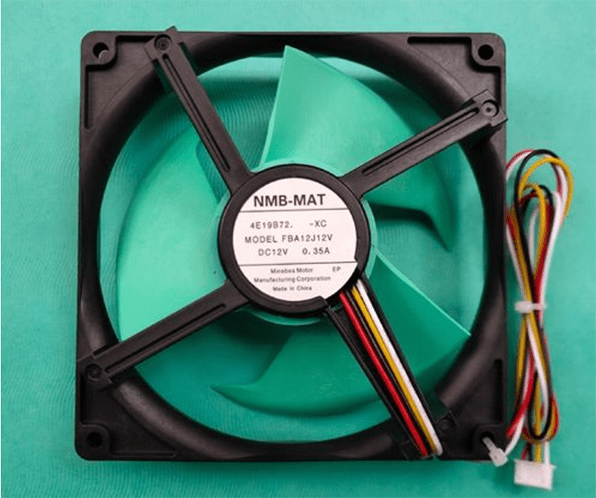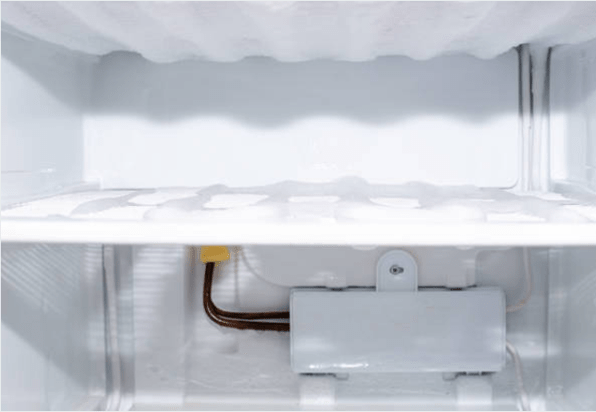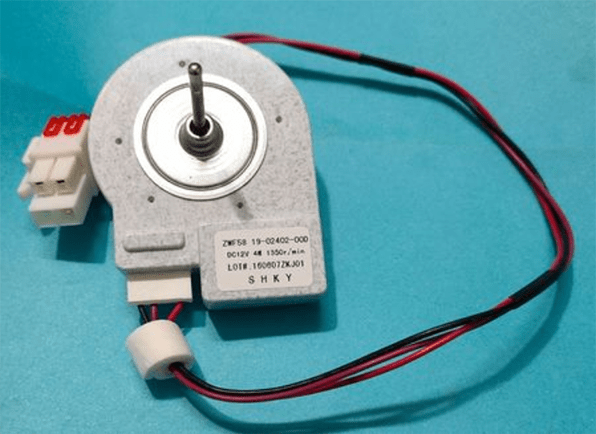Video: Troubleshooting and Resolving Samsung Refrigerator Fan Noise Issues

Figure 1: NMB-MAT refrigerator fan.
Samsung refrigerators are known for their advanced features and innovative design, but like any appliance, they can
encounter issues over time. One common concern that users may face is an unusual fan noise emanating from the
refrigerator.
This article delves into the potential reasons behind Samsung refrigerator fan noise and offers troubleshooting steps to resolve
these issues.
1. Understanding the Types of Fans in a Samsung Refrigerator
Refrigerator Evaporator Fan:
1. Responsible for circulating air within the refrigerator and freezer compartments.
2. Located near the evaporator coils.
Refrigerator Condenser Fan:
1. Found near the compressor and responsible for cooling
the refrigerator's condenser coils.
2. Aids in dissipating heat generated during the refrigeration process.
2. Common Causes of Samsung Refrigerator Fan Noise
1. Ice Buildup
Accumulation of ice around the evaporator fan or blades can cause a buzzing or humming noise.
Check for frost or ice buildup and defrost the freezer if necessary.
2. Faulty Evaporator Fan Motor
A malfunctioning motor can produce grinding, squealing, or loud humming noises.
Inspect the fan motor for visible damage and listen for irregular sounds.
3. Loose or Misaligned Fan Blades
Loose or misaligned blades may cause a rattling or whirring noise.
Gently adjust or tighten the blades to eliminate the noise.
4. Obstruction in the Fan
Items stored in the refrigerator may obstruct the fan blades, causing noise.
Ensure there are no obstructions and rearrange items if necessary.
5. Condenser Fan Issues
If the condenser fan is faulty, it may produce a rhythmic clicking or buzzing sound.
Inspect the fan for damage and replace if needed.

Figure 2: Freezer compartment with ice.
3. Troubleshooting Steps for Samsung Refrigerator Fan Noise
1. Defrost the Freezer
If ice buildup is the issue, manually defrost the freezer by unplugging the refrigerator and allowing the ice to
melt.
2. Inspect and Clean the Evaporator Fan
Turn off the refrigerator and access the evaporator fan.
Clean any accumulated debris and ensure there are no obstructions.
3. Check for Loose Blades
Gently spin the fan blades to identify any wobbling or misalignment.
Tighten loose blades or realign them to eliminate noise.
4. Examine the Evaporator Fan Motor
Inspect the fan motor for visible damage.
If damaged, consider replacing the motor.
5. Ensure Proper Ventilation
Adequate airflow around the refrigerator is essential.
Ensure there's enough space between the appliance and the wall for proper ventilation.
6. Evaluate the Condenser Fan
Examine the condenser fan for damage.
Replace the fan if clicking or buzzing noises persist.
7. Temperature Settings
In some cases, excessively low temperatures may cause the fan to work harder, producing more noise.
Adjust the temperature settings and monitor the noise level.
8. Professional Assistance
If troubleshooting steps don't resolve the issue, seek assistance from a certified Samsung technician.
Professionals can diagnose and address complex problems with precision.

Figure 3: Refrigerator maintenance.
4. Preventive Measures for Avoiding Refrigerator Fan Noise
Regular Maintenance
Clean the refrigerator coils and fans regularly to prevent dust and debris buildup.
This ensures optimal performance and minimizes the risk of noise issues.
Proper Food Storage
Organize items within the refrigerator to prevent obstruction of fan blades.
Be mindful of the placement of tall items that may interfere with the fans.
5. FAQs about Refrigerator Fans and Fan Motors
5.1 Refrigerator Fan Not Working
If the refrigerator fan is not working, it can lead to cooling issues. Troubleshoot by checking for common problems:
1. Power Supply: Ensure the refrigerator is receiving power.
2. Thermostat Settings: Verify that the thermostat is set correctly.
3. Blocked Fan Blades: Clear any obstructions that might hinder the fan's movement.
4. Faulty Motor: A malfunctioning fan motor may need replacement.
5. Defrost Timer: If applicable, check the defrost timer, as a malfunction can impact the fan.
6. Professional Assistance: If issues persist, seek help from a technician for a comprehensive
diagnosis and repair.
5.2 How Much Does a Refrigerator Fan Motor Cost?
The cost of a refrigerator fan motor can vary depending on factors like the brand, model, and whether it's an OEM
(Original Equipment Manufacturer) or aftermarket part. On average, prices range from $50 to $200.
OEM parts tend to be more expensive but ensure compatibility. Consider labor costs if hiring a professional for
installation. It's advisable to check with the refrigerator's manufacturer or a reliable appliance parts supplier
for specific pricing based on your model.

Figure 4: Refrigerator evaporator fan motor.
5.3 What Happens When a Refrigerator Fan Stops Working?
When a refrigerator fan stops working, it disrupts the airflow crucial for maintaining consistent temperatures. This
can lead to several issues:
1. Inadequate Cooling: Without proper circulation, the refrigerator and freezer may not reach or
maintain the desired temperatures.
2. Uneven Cooling: Certain areas may become colder than others, affecting food freshness.
3. Ice Buildup: Lack of airflow can cause ice to accumulate on the evaporator coils, further
hindering cooling efficiency.
4. Compressor Strain: The compressor may work harder to compensate, potentially leading to
increased energy consumption and premature wear.
Prompt repair or replacement of the fan motor is essential to avoid food spoilage and maintain the refrigerator's
efficiency.

Figure 5: Refrigerator fan.
5.4 What Happens When Refrigerator Condenser Fan Fails?
When a refrigerator condenser fan fails, it disrupts the heat dissipation process, leading to several potential
issues:
1. Overheating: The condenser coils can overheat, causing the refrigerator to struggle in
maintaining cool temperatures.
2. Inefficient Cooling: Without proper heat dissipation, the overall cooling efficiency of the
refrigerator decreases.
3. Compressor Strain: The compressor may work harder to compensate for the lack of cooling,
potentially leading to increased energy consumption and premature wear.
4. Temperature Fluctuations: Inconsistent temperatures within the refrigerator and freezer
compartments can occur.
Prompt replacement or repair of the condenser fan is crucial to prevent these issues and maintain the refrigerator's
optimal performance.

Figure 6: Refrigerator fan motors.
5.5 Where is the Evaporator Fan Motor Located in a Refrigerator?
The evaporator fan motor in a refrigerator is typically located inside the freezer compartment. It is positioned
near the evaporator coils, which are responsible for absorbing heat from the refrigerator and freezer. The
evaporator fan circulates air over the coils, helping to distribute cold air throughout the appliance.
If you need to access the evaporator fan motor for troubleshooting or replacement, you may need to remove the
freezer's back panel or other components depending on the refrigerator's make and model. Always refer to the
manufacturer's guidelines or user manual for specific instructions.
6. Conclusion
Samsung refrigerator fan noise can be bothersome, but many issues can be resolved through careful troubleshooting.
By identifying the type of fan causing the noise and addressing specific issues like ice buildup, loose blades, or
faulty motors, users can restore their refrigerator's quiet operation.
Regular maintenance and preventive measures contribute to the longevity and efficient performance of Samsung
refrigerators, ensuring a quieter and more reliable appliance for years to come. If problems persist, seeking
professional assistance is recommended to diagnose and resolve complex issues effectively.



